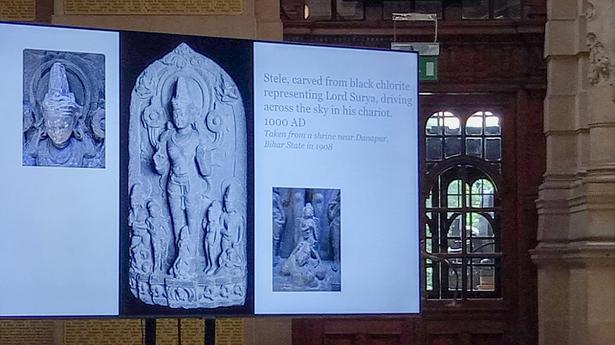
Scotland museum signs deal to return seven ancient artefacts to India
The Hindu
The arrangement was formalised on August 19 at a transfer of ownership ceremony at the Kelvingrove Art Gallery and Museum in the presence of Acting Indian High Commissioner to the U. K. Sujit Ghosh.
Seven artefacts, including a stone door jamb stolen from a Hindu temple in Uttar Pradesh, has been transferred back to India by Glasgow’s museums as part of Scotland’s “largest-ever” repatriation of objects from a single collection.
Glasgow Life, a charitable organisation which runs the city’s museums, had confirmed the handover earlier this year and the arrangement was formalised on August 19 at a transfer of ownership ceremony at the Kelvingrove Art Gallery and Museum in the presence of Acting Indian High Commissioner to the U. K. Sujit Ghosh.
The seven antiquities to now find their way back to India include a ceremonial Indo-Persian talwar or sword, believed to date back to the 14th century and an 11th century carved stone door jamb taken from a temple in Kanpur.
“We are delighted that our partnership with Glasgow Life has resulted in a decision to restitute Indian artefacts from Glasgow museums to India,” said Mr. Ghosh.
“These artefacts are an integral part of our civilisational heritage and will now be sent back home. We express our appreciation to all the stakeholders who made this possible, especially Glasgow Life and Glasgow City Council,” he said.
Most of the objects were removed from temples and shrines in various states in northern India during the 19th century, while one was purchased following a theft from the owner. All seven artefacts were gifted to Glasgow’s collections, according to Glasgow Life.
“The transfer of ownership of the Indian antiquities symbolises a significant step for Glasgow, with the city continuing its positive repatriation history by ensuring these cultural artefacts are placed back in the hands of their legitimate owners,” said Duncan Dornan, Head of Museums and Collections, Glasgow Life.











